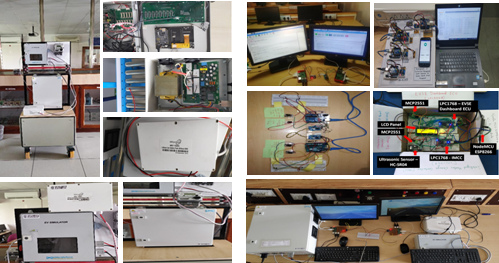Development and Prototyping of ICT enabled Smart Charging Network Components
Consortium Partners: IIT Delhi (Lead), Amrita Vishwa Vidyapeetham, Thapar University, Lithium Urban Technologies Industry Partners: Linkwell Telesystems Pvt. Ltd., Yexcube Technologies, Elecsys Technologies Pvt. Ltd., GDF Suez Energy
Total Fund: Rs. 10, 01, 76, 300/-
The consortium project aims to design and develop a bidirectional EVSE for residential and public charging stations. The proposed system will incorporate control algorithms to limit the introduction of harmonics, dc and non-sinusoidal currents; a net-meter following IEC 62056 (DLMS/COSEM) communication standard for monitoring, supervisory control and data storage in V2G environment; a communication architecture integrating consumers, vehicles (as load or source), and utility (electrical and infrastructure). The work also involves setting up of central server with necessary cloud based software applications for EV users and EV fleet operators involving integration of electric utility, facilitating Demand Response/Dispatch & Dynamic pricing based export/import tariff, etc. The system will enable consumer decisions on when and where to charge the vehicle, the EV must communicate with charging stations (fast and regular charging) about their state of charge, the number of slots available at a particular charging station, the current pricing of charging etc. The effect of the charging stations on the grid and grid technologies would also be a part of the pilot. The project will demonstrate the coordinated charging of EVs fleet and facilitate the study/ simulation of grid load management scenarios, bidding strategy for the charging stations etc. for the aggregators to manage the costs of power.
Specific Objectives
- To design a bidirectional Electric Vehicle Supply Equipment for residential and public charging stations as per ARAI standards.
- Development of control algorithms to limit the introduction of harmonics, dc and non-sinusoidal currents.
- To develop a net-meter following IEC 62056 (DLMS/COSEM) communication standard for monitoring, supervisory control and data storage in V2G environment.
- Development of communication architecture integrating consumers, vehicles (as load or source), and utility (electrical and infrastructure)
Status – Completed. Attained TRL-4 (Amrita).
- Development of EV charging emulators
- Implementation of GB/T and OCPP messages in EV charging emulators
- Implementation of GB/T, CHAdeMO and OCPP messages in MATLAB for HIL system development
- Development of BMS simulator in MATLAB for HIL system development
- Development of CMS services like end user Android apps, Web apps, server-side apps and cloud algorithms
- Development of chargers in MATLAB and in hardware with different specifications
- Implementation of algorithms and smart models for SoC, SoH, slot booking, charging station recommendation, grid integration etc.







